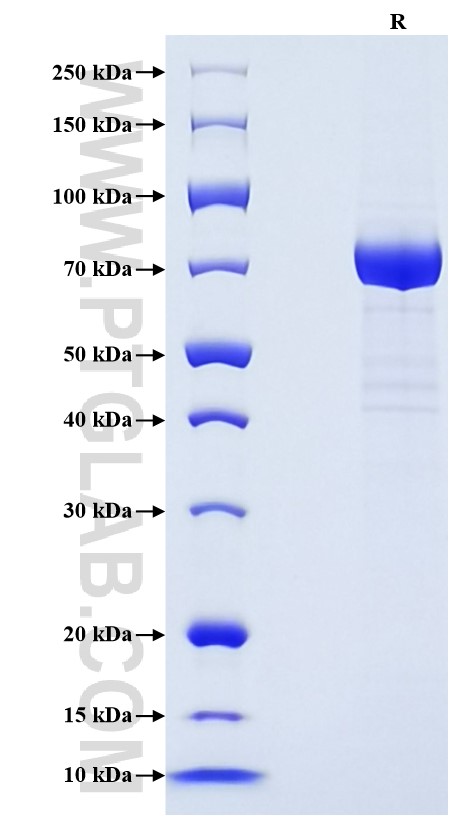Recombinant Mouse VE-cadherin/CD144 protein (His Tag)
种属
Mouse
纯度
>90 %, SDS-PAGE
标签
His Tag
生物活性
未测试
验证数据展示
产品信息
| 纯度 | >90 %, SDS-PAGE |
| 内毒素 | <0.1 EU/μg protein, LAL method |
| 生物活性 | Not tested |
| 来源 | HEK293-derived Mouse VE-cadherin protein Asp46-Ala592 (Accession# P55284) with a His tag at the C-terminus. |
| 基因ID | 12562 |
| 蛋白编号 | P55284 |
| 预测分子量 | 63.1 kDa |
| SDS-PAGE | 65-80 kDa, reducing (R) conditions |
| 组分 | Lyophilized from 0.22 μm filtered solution in PBS, pH 7.4. Normally 5% trehalose and 5% mannitol are added as protectants before lyophilization. |
| 复溶 | Briefly centrifuge the tube before opening. Reconstitute at 0.1-0.5 mg/mL in sterile water. |
| 储存条件 |
It is recommended that the protein be aliquoted for optimal storage. Avoid repeated freeze-thaw cycles.
|
| 运输条件 | The product is shipped at ambient temperature. Upon receipt, store it immediately at the recommended temperature. |
背景信息
Cadherins are a family of transmembrane glycoproteins that mediate calcium-dependent cell-cell adhesion and play an important role in the maintenance of normal tissue architecture. Vascular endothelial cadherin (VE-cadherin), also known as Cadherin-5 (CDH5) or CD144, is a member of the type II classical cadherin family of cell adhesion proteins. VE-cadherin is expressed specifically in endothelial cells and mediates homophilic adhesion in the vascular endothelium. VE-cadherin plays a role in the organization of lateral endothelial junctions and in the control of permeability properties of vascular endothelium. VE-cadherin has also been shown to be required for angiogenesis.
参考文献:
1. Julia Brasch, et al. (2011) J Mol Biol. 408(1):57-73. 2. M G Lampugnani, et al. (1992) J Cell Biol. 118(6):1511-22. 3. G Breier, et al. (1996) Blood. 87(2):630-41. 4. Yann Wallez, et al. (2006) Trends Cardiovasc Med. 16(2):55-9. 5. Dietmar Vestweber, et al. (2008) Arterioscler Thromb Vasc Biol. 28(2):223-32.
